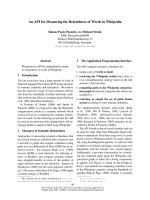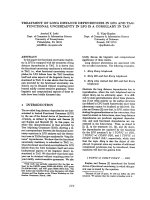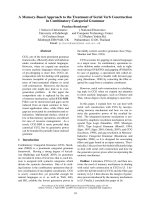Conversation in action Lets talk
Bạn đang xem bản rút gọn của tài liệu. Xem và tải ngay bản đầy đủ của tài liệu tại đây (11.76 MB, 112 trang )
First Edition 1997
Reprinted 1999
Reprinted 2001
Conversation
in
Action
•
Let's Talk
by
Edward
R.
Rosset
Editorial
Stanley
This page intentionally left blank
Escrito
por /
Written
by
Edward
R.
Rosset
Miembro
del
Colegio
de
Licenciados
de
Filosofia
y
Letras
de
Euskadi.
Member
of the
Bachelor
of
Arts Association
of
Euskadi.
Editado
por /
Edited
by
Editorial Stanley
Diseno
y
Maquetacion
/ Lay out
Angela
Gomez
Martin
Diseno portada
/
Front
Page
design
Esquema
llustrado
por /
Illustrated
by
Daniel Redondo
Imprime
/
Printers
Imprenta
Berekintza
©
Editorial
Stanley
Apdo.
207 -
20300
IRUN
-
SPAIN
Telf.
943 64 04 12 -
Fax.
943 64 38 63
www.libross.com
I.S.B.N.
84-7873-326-4
Dep. Leg. BI-1325-01
Primera
Edicion
/
First Edition 1997
Reimpresion
/
Reprinted 1999
Reimpresion
/
Reprinted 2001
This page intentionally left blank
Introduction:
Conversation
in
action
es un
libro
disenado para profesores.
las 50
unidades
de que
consta
el
libro
son el
resultado
de
muchos anos
de
experiencia
en el
area
de los
idiomas.
Recoge
la
problematica
de
muchisimos profesores
que
tienen
dificultades
a la
hora
de
hacer
que los
alumnos hablen
en
ingles.
Otras
tienen
dificultad
en
encontrar temas
de
que
hablar,
sin
estarse
repitiendo
continuamente.
Por una
causa
o por
otra,
la
experiencia demuestra
que los
profesores
se
pasan
la
hora
entera hablando
mientras
que los
alumnos responden
con
monosilabos.
Este
libro
proporcionan
al
prafesor
infinidad
de
preguntas
sobre
un
tema
determinado
ademas
de
ideas
interactivas;
con
ello
se
crea
una
atmosfera apropiada para
que los
alumnos
se
expresen
en
ingles.
El
libro
consta
de 50
unidades.
En
cada
unidad
se
desarrolla
un
tema
diferente.
Contiene
40
preguntas sobre
cada
topico.
Completan
la
unidad
un
dibujo
y un
texto sobre
lo que
hay
que
hacer preguntas,
y
respuestas
asi
como
dar
explicaciones;
tambien
se
forman
parejas
o
grupos para
discutir,
comentar sobre aseveraciones
y
para decir
si
algo
es
correcto
o no.
Introduction:
Conversation
in
action
is a
book designed
for
teachers.
The 50
units
that
make
up the
book
are the
result
of
many years
of
experience
in the
area
of
languages.
It
tries
to
solve
the
problems
of
many teachers
that
have
difficulties
in
making
pupils
speak
in
English.
Others have
a
hard
time
in
finding
topics
to
speak about,
without
repeating
themselves
day
after day.
For
one
reason
or
other,
the
experience shows
that
teachers spend
the
whole class
speaking,
while
pupils answer
with
monosyllables. This book provides
the
teacher
with
endless
questions,
besides
interactive
ideas;
with
this,
an
appropriate
atmosphere
is
created
for the
students
to
express themselves
in
English.
The
book
is
made
up of 50
units;
a
different
topic
being
worked
out in
each
unit
There
are 40
questions about
each
topic.
An
illustration
and a
text about which
the
pupils have
to
make questions
and
answers
as
well
as
give explanations, complete
the
unit
Couples
or
groups
are
made
up to
discuss,
to
comment about assertions
and to
decide
whether
some
things
are
true
or
false.
This page intentionally left blank
•
Index
1 •
Family
2
2 •
Games
and
sports
4
3 •
Married
life
or
Living
together — 6
4
•
Holidays
/
Vacations
8
5 •
Shopping
10
6 • At
school
12
7 •
Films
14
8 •
Housekeeping
16
9
.
jobs
18
10 •
Military
Service
20
11 •
Television
22
12 -
Christmas
24
13 •
Driving
26
14 •
Travelling
28
15 •
Learning
a
foreign
language
30
16 • In a
restaurant
32
17 •
Success
in
life
34
18 •
Hotels
36
19 • At the
bank
38
20 •
Pubs
40
21 • At the
Doctor's
42
22 • At the
hospital
44
23 •
Natural Medicine
46
24 •
Occultism
48
25 •
Hypnotism-Telepathy
50
26 •
Collecting things
52
27 • At the
dentist
54
28 • At the
hairdresser's
56
29 • At the zoo 58
30 . At the beach
31 •
Tourism
62
32 •
Being
a
king
64
33
•
Politics
66
34
•
Religions
68
35 •
Popular
festivals
70
36 . Party time
37
• A
department
store —.
74
38 •
Studying
or
working 76
39 •
Having
a
baby — 78
40 •
Cruising
80
41
• A
desert
Island
.
82
42
•
Reading
84
43
•
Professions —
86
44
•
Actors
88
45
•
Football
90
46 •
Policemen
92
47 • A
street market
94
48
•
Writing
96
49
•
Painting
98
50
•
Sailing
100
72
60
Conversation
in
Action
•
Let's Talk
1 •
Family
Glossary
married
age
advantage
disadvantage
wives
husbands
allowed
disabled
share
nowadays
teach
quarrel
reasons
make
up
apologize
believe
presents
Description
of the
scene:
Suggested
roleplays
and
dialogues
•
In
pairs, make
up
short dialogues.
You
and
your sister
are
laying
the
table.
•
In
pairs, make
up a
dialogue
in
which
your sister
is
doing
the
cooking.
•
In
groups
of
three,
think
up a
conversation
in
which
you
three
are
clearing
the
table after
dinner.
Make
comments
on the
following
statements
•
It's nice
to
live
in a
quiet place
away
from
the
traffic,
in the
suburbs.
•
It's nice
to
have many children.
•
The
husband
and the
wife should
both
go to
work.
•
The
children should make
their
own
beds.
•
Children should
go to a
nursery.
Questions
on the
scene
•
How
many people
are
there
in the
picture?
•
What
are
they doing?
•
What
has the
older
girl
in her
hands?
•
What
has the
father
got in his
hand?
•
What about
the
boy?
•
What's
the
mother doing?
•
What's over
the
table?
•
What's
the
father wearing?
•
And the
rest
of the
family?
•
What's
on the
table?
True
or
false.
Give
reasons
•
Arabs
are
allowed
to
have
four
wives.
•
Arab women
are
allowed
to
have
four husbands.
•
Nowadays families have
an
average
of six
children.
•
Many wives
go to
work nowadays.
•
In the old
days
men
didn't
do the
housework.
•
Nowadays married people have
to
choose
between having children
or
having
a
car.
Questions
based
on
language
functions
•
What does
the
father
say to the
children
if he
wants them
to lay
the
table?
•
What
do the
children
say if
they
are
watching
an
interesting
programme
on TV?
•
What does
the
father
say if he
wants
them
to
switch
off the TV?
•
How
does
the
husband
say to the
wife
that
he
would like
to
have
a
coffee
after dinner?
2
zTT
married
for
fifteen
years. Robert
works
in a
factory,
he's
a
machine
operator.
He
works
from
8 to 3.
Lucy works
at the
local
supermarket.
She's
the
supervisor
of the
check-out.
She
works
part
time,
from
10 to 2.
They
have
four
children,
Mark,
14,
John,
13,
Hilda,
11 and
Jane,
8.
Mark
and
John
go to
St.
Mary's Secondary
school
of the
local
County
council.
Hilda
and
Jane
are
still
at
Primary
School.
They
live
in a
little
cottage
in
Park Lane.
The
back
of
the
house
gives
on to the
park
and
it's
a
very
quiet
place.
There
is no
noise,
no
traffic.
The
only
noise
they
hear
comes
from
the
children
playing
in the
park,
or the
birds
in the
trees.
The two
boys
often
go out
with
their
friends
at the
weekends.
Sometimes
they
go to the
school
sports
grounds
to
play
football.
The
girls
like
to
stay
at
home
watching
TV
or
playing
in the
garden.
They have
a
little
Yorkshire
Terrier.
They
all
like
playing
with
the
dog.
Questions
1. How
long
have Robert
and
Lucy been
married?
2.
Where does Robert work?
3.
What
are his
working hours?
4.
What does Lucy
do?
5.
Does
she
work
full
time?
6.
What
are the
ages
of the
four children?
7.
Which school
do the
boys
go to?
8.
What about
the
girls?
9.
Where
do
they
live?
10.
What's
at the
back
of the
house?
11.1s
it a
noisy street?
12.
What's
the
only noise they
can
hear?
13.
What
do the
boys
do at the
weekends?
14.
What about
the
girls?
15.
What sort
of dog do
they
have?
Family
1.
What's
your
first name?
2.
What's
your
surname (family
name)?
3.
What's your mother's name?
4. Do you
have
any
brothers
or
sisters?
5.
What
are
their
names?
6.
What's your father's
name?
7.
Do you
have
a
grandfather
or
grandmother?
8. How old are
they?
9. Do you
have
any
uncles
or
aunts?
10. How
many cousins have
you
got?
11
.What
are
their
names?
12. Are
they
older
than you?
13. How old are
they?
14. Are
they boys
or
girls?
15.
Where
do
your
cousins live?
16.
Where
do
your
grandparents live?
17.
What does your father
do?
18.
Where does your mother work?
19.
Does your father have
a
car?
20.
What
kind
of car is it?
21. Do you
know
the
make?
22.
What does your brother
do?
23.
What about your sisters? What
do
they
do?
24. Do you
live
in a
house
or in a
flat?
25. Do you
have your
own
room?
26.
Does your brother
or
sister have
his/her
own
room?
27.
What
do you
have
in
your room?
28. Can you
describe
your
house
or
flat?
29. Do you
have
a
garden
or a
balcony?
30.
Have
you got a
pet?
31
.What kind
of pet
have
you
got?
32.What's
its
name?
33. How old is it?
34.
Does
your
mother
let you
have
a pet in the
house?
35.
How do you get on
with
your brother/sister?
36.
Do you
quarrel
or
argue
with
him/her?
37.
Do you go to the
same
school
as
your
brother/
sister?
38. Do
your grandparents live
with
you?
39. Do you
have
a
great-grandfather/grandmother?
40. Do
your grandparents give
you any
pocket money?
3
ert and lucy are married.
they've been happily
2 •
Games
and
sports
Description
of the
scene:
Suggested
roleplays
and
dialogues
•
In
pairs, make
up
short
dialogues
in
which
one of
pupils explains
to
the
other
the
difference between
sports
and
games.
•
In
groups
of
three, make
up
short
conversations
in
which
the
pupils
comment
on the
difference
between
sport
to
keep
fit and
sport
for
competition.
•
In
pairs,
the
students
can
speak
about
their
favourite sports.
•
In
pairs,
ask
them
to
make
a
list
of
all
the
sports they
can
remember.
See
which pair remembers most.
Make
comments
on the
following
statements:
•
Competition
is
better than sports
for
keeping fit.
•
Individual sport
is
better than team
sports.
•
People should
go in for
sport every
day
not
just
at
weekends.
•
Running
a
marathon
is
good
for
health.
•
Running
is
good
for
women.
•
Competing
is
good
for
health.
Questions
on the
scene
•
What's
the
woman
in the
first
picture doing?
•
What's
the
woman
on the top
right
picture doing?
•
What's
the man on the
bottom left
picture doing?
•
What's
the man on the
bottom
right
picture doing?
•
What
are
they
all
wearing?
True
or
false.
Give
reasons
•
In
sport, teams compete
one
against
the
other.
Glossary
game
hardest
dangerous
laziest
harm
championship
team
referee
mistakes
match
score
chess
to
draw/tie
to
climb
to
keep
fit
•
Football
and
basketball
are
games.
•
If
both
sides
score
the
same
number
of
goals
it is a
draw.
•
At
weekends many people
go in for
games.
•
Amateurs
are
very well paid.
Questions
based
on
language
functions
•
What does
the
referee
say to the
players
when
the
match
is
going
to
start?
•
What does
the
starter
say to the
ahtletes
when
the
race
is
about
to
start
and
when
they
must
get to
their
marks?
•
How
does
the
captain
of a
football
team
say to one of the
players that
he
has to
replace
the
injured
goal
keeper?
•
How do you
think
the
finish
line
judge
will
tell
an
athlete that
he
still
has
another
lap to go?
h
'Mr
Jones, what's
the
difference
between
games
and
sports?'
'Well,
Jimmy,'
said
the
teacher
smiling
at the
little
boy
sitting
at the
front,
'a
game
is
usually
a
competition
between
two
teams
or two
people.
The
side
that
scores
more
points
wins.
We
speak
about
playing
a
game
of
football,
of
tennis,
cricket,
baseball,
basketball,
rugby,
volley-ball,
hockey,
ping-pong,
chess
and
many
others.
In a
game,
a
person
or a
team
wins
and the
other
side
loses.
Of
course,
they
can
also
draw
or
tie;
sometimes
it's
called
equalize;
another
expression
for a
draw
is two
all,
three
all,
or two to
two,
three
to
three,
etc.'
Sport,
on the
other
hand,
is
more
individual.
You
don't
usually
score
points.
You
don't
'play'
or
'practise'
a
sport.
You 'go in
for'
or
'take
up'
sport.
Running,
jumping,
throwing,
swimming,
walking,
climbing,
cycling,
doing
gymnastics,
etc,
are all
sports.
Many
people
go in for
sports
or
play
games
at the
weekends
just
to
keep
fit.'
Questions
1.
Where's this conversation
taking
place?
2.
What's
the
name
of the
teacher?
3.
What's
the
name
of the
little
boy?
4.
What does
the boy
want
to
know?
5.
Where's
he
sitting?
6.
What does
the
teacher
do
when
he
answers
the
question?
7.
What
is a
game?
8.
Which side wins
in a
game?
9.
Give
the
names
of two
games
not
mentioned
in the
reading.
10. Do the
same
with
sports.
11.
When
the two
teams have
the
same
number
of
points,
they.
12. You
play games,
but
what about sport? You.
13. Why do
some
people
play games
at
weekends?
14. Do you
score points
in
sport?
15.
What's usually more
individual,
a
game
or a
sport?
Games
&
sports
1.
What's
your
favourite sport?
2.
What games
do you
usually play?
3.
Mention
all the
games
and
sports
you can
think
of.
4.
What's
the so
called
'sport
king'?
5.
What sport
do
people practise,
or go in
for,
in
your
country?
6.
Mention
the
games that
the
English play.
7.« « « «
Americans play.
8. Do you do any
sport?
9. Are you
good
at any
games
or
sports?
10.
Which
do you
think
is the
hardest sport?
11.
Which
do you
think
is the
most dangerous?
12.
Which
do you
think
is the
laziest?
13. Do you
think
sport
is
good
for the
health?
14. Can you
mention
some benefits
sport
provides?
15. Is
there
any
harm that sport
may do to
you?
16.
What
do you
think
of
running?
17.
What
are the
advantages
of
running?
18.
What
are the
disadvantages?
19.
What
do you
think
of
running
marathons?
20.
What
do you
think
of
competing
in
thriathlons?
21.
What
is the
difference between professional
and
amateur
sport?
22.
What
do you
think
of
professional sport?
23. Do you
think
professional
sport
should
be
paid?
24. Do you
know
any
names
of
professional
sportsmen?
25.
Mention
some
names
of
professional players
or
sportsmen.
26.
What about sports women?
do you
know
any?
27.
Do you
know
how
many hours professionals train?
28.
Would
you
like
to be a
professional
sporstman/
woman?
29.
Would
you
like
to go to the
Olympic
Games?
30. Do you
watch them
on TV?
31
.Which
sports
do you
like
to
watch most?
32.
What
do you
think
of
football
on TV?
33. Do you
like
watching
the
World Cup?
34.
Do you
know
which
team
won the
last
championship?
35.
Where
did the
championship take place?
36.
Have
any
Olympic
Games
taken place
in
your
country?
37.
Would
you
like
to
help
in the
stadium?
38.
What
would
you
like
to do?
39.
Have
you
ever been
a
referee? what
do you
think
of
them?
40. Do
referees make
mistakes?
Should
a
match
be
repeated?
5
3 •
Married
life
or
Living together
Glossary
surname
aunt
uncle
cousin
kind
the
make
quarrel
argue
death
percent
hell
arguing
tiredness
tend
Description
of the
scene:
Suggested
roleplays
and
dialogues
•
In
pairs, make
up a
conversation
between
a
grandfather
and his
grandson.
•
In
pairs, make
up a
conversation
about cars.
•
In
groups
of
three, make
up a
conversation
about houses. Where
they
should
be
located,
etc.
•
In
groups
of
four,
make
up a
conversation
about pets
at
home.
Make
comments
on the
following statements.
•
In the old
days people
didn't
get
divorced.
•
Discussions start when people
are
tired.
•
Arguing
in
front
of the
children.
•
Living
in a
house
or in a
flat.
•
Having
a pet in the
house.
•
Living
with grandparents.
Questions
on the
scene
•
What's
the man
doing
in the
first
picture?
•
How old do you
think
he is?
•
Where's
the car in the
second
picture?
•
Is it an
expensive
car?
•
Is
that
a
flat
in the
third
picture?
•
Are
there
any
trees?
•
What's there
in the
fourth picture?
•
What
has he got
with
him?
•
What's
he
carrying?
True
or
false.
Give
reasons
•
You can
have
a
garden
in a
flat.
•
Brothers
and
sisters argue very
often.
•
Grandparents
often
take
the
children
for a
walk.
•
Children
often live with
their
cousins
in the
same
house.
Questions
based
on
language
functions
•
What does
the boy say to his
sister
if he
wants
to
watch another
programme?
•
What does
the
girl
say if she
doesn't want
to
change
the
channel?
•
What does
the
child
say to the
grandfather
if he
wants
to go to
the
park?
•
How
does
the
grandfather
say to
the
child
that they can't
go out
because it's
raining?
6
Not
many years ago,
when
two
people
got
married
it was for
good,
'until
death
separated
them'.
Very
few
marriages
ended
up in
divorce.
Nowadays,
about
fifty
percent
of the
couples
that
get
married
separate after
a few
years
of
living
together.
Married
life
can be
very
pleasant
if
there
is
love
between
husband
and
wife,
or it can be
hell
if
they
keep
arguing
and
criticising
each
other
all the
time.
Psycologists
say
that
couples
should
watch
for
tiredness.
When
people
are
tired
after
a
long
day at
the
office,
they
tend
to be
irritable
and
answer
back.
Experts
say
that
we
must
be
thankful
for
what
we
have,
and
repeat
to
ourselves
that
we are
very
happy.
If a
person
repeats
it
many
times
a day he/
she
will
end up
believing
it, and
then,
he/she
will
really
be
happy.
Questions
1. Was
divorce common
a few
years ago?
2.
For how
long
were people married?
3. How
many couples
get
divorced nowadays?
4.
When
can
married life
be
pleasant?
5.
When
can
married life
be
hell?
6.
What
do
psycologists
say?
7.
What happens after
a
long
day at the
office?
8.
What
do
experts
say?
9.
What happens when
you
repeat something many
times
to
yourself?
10.
What will happen
if you
believe that
you are
happy?
Married
life
or
Living
together
1. Are you
married?
if
not, would
you
like
to get
married?
2.
What
is the
best
age to get
married?
3. How old
were your parents when they
got
married?
4. How
many
children
would
you
like
to
have?
5.
What
are the
advantges
and
disadvantages
of
having
one or two
children?
6.
What
are the
advantages
and
disadvantages
of
having many?
7.
What
are the
advantages
and
disadvantages
of
married life?
8.
Would
you
live
with
your
boy/girlfriend
without
being
married?
9.
What
are the
advantages
of
this
living
together
arrangement?
10.
What
are the
disadvantages
of it?
11. Do you
believe
in
equality between husband
and
wife?
12.
What
do you
think
about Arabs'
wives?
13.
What happens
if
they don't obey
their
husbands?
14.
What happens
to
adulterous women
in an
Islam country?
15.
What happens
to
aduterous
men in an
Islam
country?
16. How
many wives
are
Arabs allowed
to
have?
17. How
many husbands
are
Arabs allowed
to
have?
18. How
many concubines
can an
Arab
have?
19.
What
other
societies
or
religions
allow several
wives?
20.
What other societies
or
religions allow several
husbands?
21.
What
is the
most important aspect
in
married life?
22. Is sex the
only attraction?
23.
Would
you get
married
to a
disabled person?
24.
Do you
think
men
should
share
the
housework?
25.
Should women
go to
work?
26. Can a
woman with
six
children
go to
work?
27.
What's more important, work
or
children?
28.
Why
don't
people have more children nowadays?
29.
Will
you
teach your children
to
make
the
beds,
etc.?
30. Why do you
think
married couples quarrel?
31.
What
are the
main reasons
for
quarrelling?
32. Who is
usually
right,
the
husband
or the
wife?
33. Do you
quarrel very often with your
boy/girlfriend?
34. Who
makes
up
usually?
35. Do you
ever apologize
to
him/her?
36.
What
do you do
when
you
make
up?
37.
Do you
believe
in
presents?
38.
Should
a
husband give
his
wife
a
present
occasionally?
39.
What about vice
versa?
40. Can
couples that quarrel often,
be
happy?
7
Description
of the
scen
Suggested
roleplays
and
dialogues
•
In
pairs,
act out a
roleplay between
two
persons
who
have
been
to an
organized
holiday/vacation.
•
In
pairs,
act out a
roleplay between
two
people
who
like
to go on
their
own.
•
In
pairs,
act out a
roleplay betwen
two
people
who
like
to go on a
trek.
Make
comments
on the
following
statements:
•
A
camping holiday.
•
A
cruising holiday.
•
Spending your holiday
by the
sea.
•
Spending your holiday
in the
mountains.
•
Reading
during
the
holidays.
Questions
on the
scene
•
What's
the
girl
in the
first picture
doing?
•
What's
the
girl
in the
second
picture doing?
•
Where's
she?
•
What
are the two
people
in the
third
picture doing?
•
What's
the man in the
fourth
picture
doing?
True
or
false.
Give reasons
•
More people prefer summer
holidays
than winter holidays.
•
People
from
the
north
of
Europe-
like
to
spend
their
holidays
in the
sun.
•
Many students spend
their
holidays
learning another language.
•
Medieval banquets
are
terribly
expensive.
Questions based
on
language
functions
•
How
does
the
husband
ask the
wife
if she
wants
to go
camping?
•
How
does
the
wife tell
her
husband
that
she
prefers
to
stay
at
good
hotels?
•
What does
the
husband
say to
inform
his
wife that they haven't
got
enough money
for
good
hotels?
•
How
does
the
wife
say
that
she
prefers
to
stay
at
home?
4/ Jp;odaus / Vacatopms
8
Some
people
like
to
have
their
holidays/vacations
organized.
They
book
it a
year
in
advance
so
they
know
which
hotel
they're
staying
at, how
much
it's
going
to
cost,
what
the
beach
is
like,
what
the
food
is
like,
and
what souvenirs
they
are
going
to
buy.
Others
like
to go
into
the
unknown
world
without
any
foresight.
They take
the car and
stop
wherever
they
like.
They sleep
in
their
own
caravan
or in a
cheap
hotel.
These
are the
adventurous
types,
usually
with
a
couple
of
children.
They
are
always
looking
for a
nice deserted beach
all for
themselves.
There
is the
third
type
-
people
who are
much
more
intrepid.
These
are the
ones
that
sail
around
the
world
in a
small
yacht;
trek
across
the
Pyrenees;
cross
over
the
Alps
following
Hannibal's
trail;
or do an
8,000m.
climb
in the
Himalayas.
Questions
Holidays
/
Vacations
1
.What
do
some people like?
2.
How
long
in
advance
do
they book
the
hotel?
3. Do
they know
how
much
the
hotel
is
going
to
cost?
4. Do
they know what
the
food
is
like?
5. Do
these people know what souvenirs they
are
going
to
buy?
6.
Some other people take
their
own
car, where
do
they stop?
7.
Where
do
they sleep?
8. Do
these people have
any
children?
9.
What
are
they
always
looking
for?
10.
About
the
third
type
of
people; give
two
more
examples
of
things they
are
likely
to do.
1.
Where
do you
usually spend your holidays?
2. Do you go
with your family?
3.
Where
did you go
when
you
were younger?
4. Do you
prefer
to
swim
in the sea or in a
swimming-pool?
5.
What
do you
think
of
places like Benidorm?
6.
What
do you
think
of
spending
a
holiday
in
your
grandfather's village?
7.
Are
there people
of
your
age
there?
8.
What
do you do in the
mornings?
9.
What about
the
afternoons?
10.
What
do you do in the
evenings?
11. Do you
spend
a lot of
money
during
your holidays?
12. How
much pocket money
do you get on
holidays?
13. Do you
spend more than
at
home?
14. How do you
feel when your holidays
are
over?
15.
Would
you
like
to
spend your holidays cruising
in
the
Mediterranean?
16.
Which
do you
prefer winter
or
summer holidays?
17.
What
do you
think
about taking
all
your
holidays
at
the
same
time?
18. Do you
think
it's
better
to
take holidays
in
parts?
19.
What
is
better
to
spend holidays with
the
family
or
with
friends?
20.
Have
you
ever been camping?
if so,
where?
21.
What
do you
think
of
camping?
22.
What
are the
advantages
and
disadvantages
of
camping?
23.
Have
you
ever been
to a
medieval banquet?
24.
What
are
they like?
25.
If you
could,
what sort
of
holiday would
you
like
to
have?
26. Do you
take
any
school books
to
revise?
27.
What about reading?
do you
read
during
your
holidays?
28. Do you
meet
any
English-speaking people
during
your holidays?
29. Do you
practise
any
other
languages?
30.
What
do you
think
of
spending your holidays
learning languages?
31
.What
do you
think
of
working camps abroad?
32.
Have
you
ever been
to
one? what
are the
benefits
or
advantages?
33.
What
are the
disadvantages
of
working camps?
34.
Have
you
ever considered spending your holidays
helping
people
in the
third
world?
35.
What
do you
think
of
working
during
your
holidays?
36.
Would
you
like
to
work
as a
waiter
or
waitress?
37.
What
do you
think
of
people
who
work
in
summer?
38.
Have
yor
ever
had to
stay
at
home because
you had
examinations
in
September?
39.
Are
holidays short
or
long?
How
long
should they
be?
40.
Should holidays
be a
time
for
reading?
9
5-
Shopping
Glossary
grocer's
yourself
antique
auction
spendthrift
to put on
bother
in a
hurry
enjoy
to
fill
huge
brim
tills
Description
of the
scene:
Suggested
roleplays
and
dialogues
•
In
pairs,
act out a
roleplay between
the
shop keeper
and the
client
in
an
old
shop.
•
In
pairs,
act out a
roleplay between
a
client
and the
girl
at the
till
in
the
local supermarket.
•
In
groups,
make
up
conversations
in
favour
and
against
the old
grocer's shops
and
modern
supermarkets.
Make
comments
on the
following
statements:
•
Hypermarkets
are
expensive
and
too far
from
the
town centres.
•
In the old
grocer's shop
the
grocer
was
a
friend
of
everybody.
10
•
Women enjoy
buying
things,
men
don't.
•
Buying
things
by
is
better.
•
People
steal
things
in a
supermarket.
Questions
on the
scene
•
How
many people
can you see in
the
picture?
•
What's
the
woman doing?
•
What
has she got in her
hand?
•
What's
she
holding
with
her
left
hand?
•
Has she
done
a lot of
shopping?
•
What does
the man at the far end
do?
True
or
false. Give reasons
•
In a
supermarket
you
have many
things
to
choose
from.
•
The
attention
you get is
very
impersonal.
•
In
large supermarkets there
are
many
special offers.
•
Men
enjoy
shopping.
•
The
Queen
of
England often goes
to the
supermarket.
Questions based
on
language
functions
•
How
does
a
customer
ask an
attendant
in a
supermarket where
the
tins
of
asparagus
are?
•
What does
the
attendant
say to
direct
him/her?
•
What
will
a
customer
say to the
cashier
in a
supermarket
if
they'll
accept
his/her
credit
card?
•
How
will
the
cashier
say
that they
don't accept that credit card?
I
remember
going
shopping
with
my
grandmother.
She
didn't
bother
to put her
shoes
on. She
went
in her
old
slippers.
The
local
grocer's
was at the
corner
of the
street.
There,
she
would
meet
three
or
four
women
and
have
a
nice
chat
while
waiting
for the
grocer
to
serve
them.
They
were
never
in a
hurry
and
enjoyed
the
waiting
time.
Old Mr
Robinson
wrote
on a
piece
of
paper,
in
pencil,
every
item
they
bought,
and
then
added
up the
quantities
using
only
his
head
and
sometimes
his
fingers.
Kind,
Mrs. Robinson
used
to
give
me a
sweet
or a
candy
for
helping
my
grandmother
to
carry
the
shopping
bag.
Nowadays,
the
young
married
couple
jump
into
their
small family
car on a
Saturday
afternoon
and
drive
to
the
Hypermarket,
outside
town.
They
fill
a
huge
trolley
to the
brim
and
join
a
long
queue
at one of the 25
tills.
They
pay
with
their
credit
card
and
push
the
trolley
to the
car.
Then,
they
drive
back
home,
park
as
near
their
place
as
possible,
and
carry
home
twenty
plastic bags each.
Questions
1.
What does
the
writer remember?
2. Did his
grandmother
put her
shoes
on?
3.
What
did she
wear when
going
shopping?
4.
Where
was the
local grocer's?
5.
What
did the
women
do
while waiting
to be
served?
6. How did Mr
Robinson
find
out the
total sum?
7. Did he use an
adding
machine?
8.
What
did Mr
Robinson's wife give
the
writer?
9. Why did she
give
it to
him?
10.
Where
do
people
do
their
shopping
nowadays?
11. How do
they
go
there?
12. How do
they carry
their
shopping?
13. How
many tills
are
there?
14. Do
they
pay
cash?
15. How
many plastic bags have they got?
Shopping
1. Do you
ever
go
shopping?
2.
What
do you
think
of the
small grocer's
at the
corner?
3.
What's
a
department store?
4.
What's
a
hypermarket?
5.
What's
a
supermarket?
6.
Where
are the
hypermarkets placed?
7.
What's
the
difference between them?
8.
What
do you
think
of
shopping
on a
Saturday
afternoon
in the
hypermarket?
9.
What
are the
advantages
and
disadvantages
of
them?
10. Do you
save
money
in the
large supermarkets?
11. Do you
enjoy
buying
clothes
or
things
for
yourself?
12. Do you
like
buying
presents
for
other people?
13.
What
do you
think
of
shopping
by
mail?
14. Do you
receive
any
catalogues regularly?
15.
What
are the
advantages
of
this
kind
of
shopping?
16.
What
are the
disadvantages?
17.
What
do you
think
of
street markets?
18. Do you
visit
them
on
Saturday
or
Sunday morning?
19. Do you
think
it is
cheaper
to buy
there?
20.
What sort
of
things
are
cheaper there?
21.
What about
the
quality
in the
street markets?
22.
Have
you
visited
a
street antique market?
23.1s
there
a
famous
one in
your country?
24.
Have
you
heard about «Petticoat
Lane»
in
London?
25.
Have
you
ever been
to an
auction?
26.
What
do you
think
of
that system
of
buying
things?
27.
What
are the
advantages
of an
auction?
28.
What
are the
disadvantages?
29.
What
do you
think
of men
doing
the
shopping?
30. Do you
look
at the
prices when
you go
shopping?
31
.Are
you a
spendthrift?
32.
What's
the
difference between
men and
women
when shopping?
33. Are men
careful with money?
34.
What things
do men
like
to
buy?
35.
What things
do
women enjoy buying?
36.
What
is the
best
day of the
week
for
shopping?
37.
At
what time
do you
usually
go to the
supermarket?
38.
Have
you
ever checked
a
supermarket bill?
why?/
why
not?
39. How do you
think
the
Queen
of
England does
her
shopping?
40.
What sort
of
things does
she
buy?
11
6 • At
school
Description
of the
scene:
True
or raise.
Give
reasons
Suggested
roleplays
and
dialogues
•
In
pairs,
act out a
conversation
between
the
teacher
and a bad
student.
•
In
pairs,
act out a
conversation
in
favour
and
against modern schools.
•
In
groups
of
three, speak about
the
advantages
and
disadvantages
of
staying
at
school
for
lunch.
Make
comments
on the
following
statements:
•
Modern
schools
are
more efficient
than
the old
ones.
•
me
number
of
pupils
in the
classes
is
smaller.
•
Women teachers
are
better than
men
teachers.
•
Nowadays most schools have
dining-rooms.
Questions
on the
scene
•
What's
the
girl
carrying
in her
hand
and
in the
bag? Where's
she
going?
•
What's
the
woman
doing
in the
classroom?
•
What
do you
think
the
teacher
is
telling
the
young
student?
•
What's
the
girl
doing
in her
desk?
•
What
are
they
all
wearing?
12
•
There
is no
corporal punishment
in
schools
nowadays.
•
Most children have lunch
at
school.
•
Teaching methods
are the
same
as
fifty years
ago.
•
Anybody
can be a
teacher.
•
Students must
be at
school
until
they
are
sixteen.
Questions based
on
language
functions
•
How do
students greet
the
teacher?
•
What does
the
teacher
tell
the
students
to do
first
thing
in the
morning?
•
How
does
a
pupil
ask the
teacher
if
he/she doesn't understand
his/her
explanations?
•
What
do the
pupils
say to the
teacher
at the end of the
day?
In
1912,
when
my
grandfather
was
born,
very
few
people
were
lucky
enough
to go to
school.
My
grandpa
had
to
walk
four
miles
to go to the
wrecked
building
that
served
as a
school.
In the
same classroom,
about
twenty
boys
and
girls
of
different
ages
sat at
hundred-year-old
desks.
Their
books
had
been
inherited
from
more
advanced
pupils
and
many
of
their
pages
had
been
torn
out or had
been
badly
scribbled
on.
The
maps
on the
wall
had
seen
better
times
and the
frontiers
of
many
of the
countries
shown
had
already
changed.
Almost
a
hundred
years afterwards,
school
children
are
collected
by a
school
bus and are
taken
to a
large
modern
building
with
a
huge
playground.
Their
classrooms
are
large
and
well
lit.
Young
trained
teachers
take
about
a
dozen
pupils
at a
time.
They
use
modern
teaching
methods
and
have laboratories
at
their
disposal. Half
a
dozen
cooks
prepare
a
well
balanced
lunch
for
five
hundred
hungry
youngsters.
At
five
o'clock
the
school
buses
deposit
them
carefully
outside
their
homes.
Questions
1.
When
was the
writer's grandfather born?
2.
Did
many people
go to
school
in
those
days?
3. How far did his
grandfather walk
to go to
school?
4.
What
was the
building
like?
5. How
many
children
were
in the
same
classroom?
6.
Were they
all of the
same
age?
7.
Can you
describe
the
books they used?
8.
Were
the
maps
on the
wall new?
At
school
1. Are you
studying
or
working?
2.
What
are
your teachers like?
3.
Describe
the
teacher
you
like most
4.
Describe
the
teacher
you
like
least
5.
What
are the
qualities
a
teacher should
have?
6.
What
are the
faults
a
teacher shouldn't have?
7.
How
many students
are
there
in
your
class?
8. How
many students
do you
think
there should
be in
a
class?
9.
What
do you
prefer
a
male teacher
or a
female
teacher?
10.
What
do you do if you
don't
understand
the
teacher's
explanation?
11. Do the
pupils usually understand
the
teacher's
explanation?
12.
What
is the
most common punishment
in
your
school?
13.
What
do you
think
of
corporal pusnishment?
14. Can you
describe some
of
these punishments?
15.
Compare
the
schools
50
years
ago and a
modern
school.
16. Are the
teaching methods
the
same?
17.
What
are the
advantages
of
modern methods?
18.
What
are the
disadvantages
of
modern methods?
19.
What
are
your memories
of
your
younger
school
days?
9. How do
school
children
go to
school nowadays?
10.
What
are the
classrooms like?
11.
What
sort
of
teachers
do
they have nowadays?
12. Do
they
still
use old
methods?
13. How
many cooks work
in the
kitchen?
14. How
many
children
go to
those schools?
15. At
what time
do
they
go
back home?
20.
Do you
remember
the
first
day you
went
to
school?
21. How did you
learn
to
multiply?
22.
How did you
learn
to
read
and
write?
23.
Do you
remember
the
first book
you
ever read?
24.
Do you
remember your first teacher? what
was he/
she
like?
25.
What
was
your classroom like?
26. Do you
think
little
children
are
happy
at
school?
27.
At
what
age do you
think
boys
and
girls
should
leave
school?
28. At
what
age do
they leave school?
29. At
what
age
will/did
you
leave
school?
30.
What subjet
do you
like best?
31
.What subject
do you
like
least?
32. Do you
study languages
at
school? Which
languages?
33. At
what
age did you
start
to
learn English?
34. Did you
start
at
school
or in a
private
class?
35. Did you
have
lunch
at
school?
36. Can you
describe
the
food
you
had?
37.
How
long
did you
stop
for
lunch?
38. Did you
like
the
first
lesson
in the
afternoon?
39.
Which
is the
worst time
for
studing?
40.
Have
you
ever
gone
to
sleep
during
a
lesson?
13
7 •
Films
Glossary
screen
dubbed
used
to be
stuntman
growth
perishable
to
crowd
eager
to
risk
goers
blood
Description
of the
scene:
Suggested roleplays
and
dialogues
•
In
pairs,
act out the
conversation
between
the two men in
picture
two.
•
In
pairs,
act out a
conversation
between
the
film
director
and a
film
star.
•
In
pairs,
act out a
telephone
conversation between
two
lovers.
Make comments
on the
following
statements
•
Violence films
are
good/bad
for
children.
•
Terror films make children afraid.
•
Love scenes should
be
considered
normal.
•
It's
better watch
a
film
on the
little/
big
screen.
•
Film
stars
shouldn't
get so
much
money.
Questions
on the
scenes
•
What
sort
of
film
is the
first
picture?
•
What about
the
second picture?
•
And the
third?
•
What
do you
think
the
woman
on
the
fourth
picture
does?
•
What
are the men
doing
in the
second picture?
True
or
false.
Give reasons
•
Films haven't changed
in the
last
fifty
years.
•
There
are
more cinemas
now
than
fifty
years
ago.
•
The
life
of a
film
star
is
very hard.
•
Films
in
black
and
white
were more
interesting.
•
European films
are
more popular
than American films.
Questions
based
on
language
functions
•
What does
the
film
director
say to
an
actress
if he
wants
to
invite
her
to
dinner?
•
What does
the
actress
say to
refuse
the
invitation?
•
What does
the
film director
say to
the
extras
in a
film
in
which they
have
to
repeat
the
'battle'?
•
How
does
the
main actress
say to
the
director that
she is
tired
and
wants
a
rest?
14
When
the
brothers
Louis
and
Auguste
Lumiere
showed
in
Paris
the
first
two
films
ever
produced
Workers
leaving
the
factory
Lumiere
and The
arrival
of the
train,
in
1895,
they
didn't
even
dream
of the
incredible
growth
of the
film
industry
a
century
later.
Unfortunately
the
first
films
were
made
of
perishable
material
(celluloid),
and
nothing
is
left
of
them.
Over
thirty
years
had to
pass
before
any
significant
advance
was
made
in the
making
of
films.
Nowadays
we
think
it's
incredible
that
people
would
crowd
in
little
rooms
eager
to
watch
the
silent
films
of the
1920's.
The
heroes
of
those
films
often
risked
their
lives
to
shoot
really
dangerous
scenes
on the
roofs
of
high
buildings.
They
would
save
their
fainting
heroines
at the
last
minute
from
an
oncoming
train
or a
falling
building.
Today
no
film
director
would
risk
the
precious
life
of a
highly
paid
film
star
in one of
those scenes.
Well
trained
stunt
men do
most
of
them.
The
taste
of
cinema
goers
has
also
changed
quite
a
lot. People, nowadays,
like
to see
true
to
life
action;
killings,
massacres,
blood
splashed
all
over
the
place.
The
more
enemies
the
hero
kills
the
better.
Films
1.
What sort
of
films
do you
like?
2. Do you
like films
in
black
and
white?
3.
What
do you
think
of old
films?
4.
What
do you
think
of
modern films?
5. Was
there
a lot of sex in
films before?
6.
What about modern films,
is
there
a lot of
sex?
7.
Do
many people
go to the
cinema
nowadays?
8.
Are
there many cinemas
in
your home town?
9. Are the
cinemas
big or
small?
10. Do you
think
modern films
are
good
or
bad?
11.
What's
the
difference between
old and
modem
films?
12.
What
do you
think
of
violence
in
films?
13. Do you
like
horror
films?
14. Can you
sleep well after seeing
a
horror
film?
15.
What's
the
best
film
you
have ever seen?
16. Why do you
like
it so
much?
17.
What's
the
most expensive
film
ever made?
18. Do you
like
watching films
on TV?
19.
What's
the
difference between
a big
screen
and a
little
one?
20.
What
are the
advantages
of
watching
the
film
on TV?
21.
Have
you
ever seen
a
film
in the
original
version?
Questions
1. Who
invented
the
cinematograph?
2.
What were
the
names
of the
first
two
films ever
produced?
3. Did the
Lumiere brothers
think
the
film
industry
would
grow
so
much?
4.
What sort
of
material
was
used
to
make
the old
films?
5. How
many years
had to
pass
before
any
advance
was
made
in the
making
of
films?
6. Did the
actors
and
actresses speak
in the
early
times?
7.
Did the
heroes
of the
films
in
those days risk
their
lives?
8. Why
were
the
scenes dangerous?
9.
Give another situation
in
which
the
heroine
is
saved
at the
last minute
by the
hero.
10.
Would
a
film
director
risk
the
life
of a
film
star
nowadays?
11. Why
not?
12.
Which people
do the
dangerous
scenes?
13. Has the
taste
of
cinema goers changed?
14.
What
do
people like
to see
nowadays?
15. Do
they
like
to see
blood?
22.
Do you
think
films should
be
dubbed?
23.
Do you
like
films with subtitles?
24.
What
do you
think
of
American films?
25. Do you
find
any
difference between American films
and
British films?
26.
Do you
like Spanish films? What
do you
think
of
them?
27.
What about French films?
28.
What about Italian films?
29.
What
do you
think
about
the
European
film
industry?
30. Do you
think
films should have
a
state subsidy?
31.
Which
is
most important
in a
film,
the
story?
the
acting?
32.
Which
film
star
do you
like best? Why?
33. Are
film
stars better actors
and
actresses
than they
used
to be?
34.
What
do you
think
of the
acting
in
your country?
35.
Which films
in
your country
have
won
Oscars?
36.
Would
you
like
to
lead
the
life
of a
film
star?
37.
What
are the
disadvantages
of
being famous?
38.
Would
you do a
love
scene?
39. Do
film
stars
do the
dangerous
scenes?
40.
Would
you
like
to be a
stuntman? Why?
15
8 •
Housekeeping
Glossary
to
share
the
washing
hoovers
dishwasher
worth
appliances
ironing
fireplace
to sew
deep
freezer
fridge
chores
dusting
get
used
to
Description
of the
scene:
Suggested
roleplays
and
dialogues
•
In
pairs,
act out the
conversation
between
the
mother
and a
daughter.
The
mother wants
the
girl
to
make
her
bed, dust
the
furniture,
etc.
•
In
pairs,
act out a
conversation
between husband
and
wife
when
one
of
them goes
out to
work.
•
In
pairs,
act out a
conversation
between
wife
and
husband about
the
distribution
of
jobs.
Make comments
on the
following
statements
•
Husbands
should
stay
in bed all
morning.
•
The
kitchen
is the
women's place.
•
Men
earn
enough
to
keep
a
family.
•
Women should look after
the
babies.
Questions
on the
scene
•
What's
the man
wearing
on his
head?
•
What's
he
doing?
•
What
time
of the day is it?
•
Did he do the
washing
up the
night
before?
•
How
would
you
describe
his
expression?
True
or
false. Give reasons
•
Housewives
get a
good
salary.
•
Modern appliances
make
life easier.
•
Our
grandmothers scrubbed
the
floors
on
their knees.
•
A
dishwasher
is not
very useful.
•
In the old
days
people cooked
in a
brass
pot
hanging over
the
fire.
Questions based
on
language
functions
•
How
does
the
repairman
say to the
housewife
that
the
washing
machine
is
broken
and
that
she'll
have
to do the
washing
by
hand
for a
week?
•
How
does
the
mother
tell
her
children that they'll have
to
make
their
own
beds every
day?
•
How
does
the
housewife
say to her
husband
that they'll have
to
share
the
housework?
•
How
does
the
husband
say to his
wife
that
he has not
time
to do the
housework?
16









